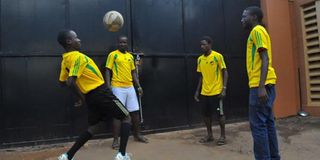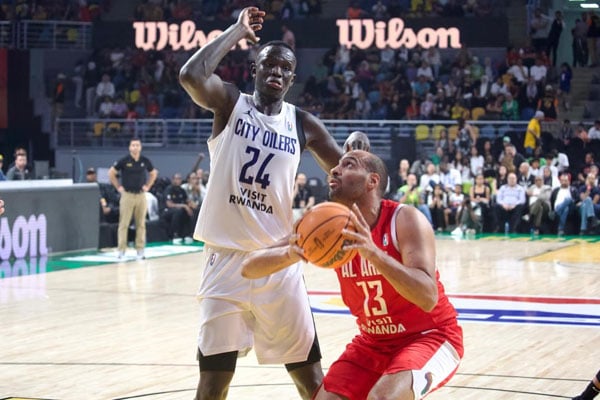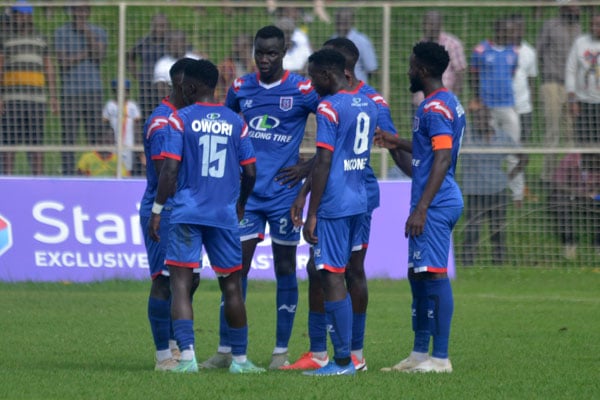They can’t hear but nothing will stop them from converting their chances

LeEFT TO RIGHT: Deaf footballers Joseph Bwanswa, Moses Kwizera, Patrick Musoke and Alex Jjuuko juggle the ball at Monitor offices. They enjoy the country’s no.1 sport despite neither talking nor hearing. Photo by Joseph Kiggundu
Kampala. Chances are that if a Ugandan football star was mentioned to you in passing, your mind would conjure up an image of a well-built man, probably handsome, with a comfortable income.
Well, that is until you meet Roy Rusa, a striker or Patrick Musoke, a goalkeeper, or Moses Kwizera, a winger, or even Joseph Bwanswa, a defender.
The only thing that separates them from other footballers is that they are deaf.
I can just about hear you asking yourself how someone with a hearing impairment can play football.
Well, if first impressions count, these do not look like footballers. They look like a group of guys taking a rest after a long walk around the city. But if you look closely, you can catch a glimpse of the footballer physique through their clothes.
As the clouds get heavier on this Sunday afternoon, our translator, Alfred Angany Smart is set to direct the interview with the five players.
“Since childhood, I have been driven by a passion to sensitise people who think that deaf people are incapable of doing anything,” says 28-year-old Bwanswa who plays for Star City Deaf FC Kampala. “I have found a way to do that through football.”
Wearing a purple tie, Bwanswa is the image of the teacher he is. His sign language is very fast, you get the feeling that the interpreter is lagging behind.
The game
The main features in the game are a red and yellow cloth, which coupled with the referee’s whistle regulate the players.
“We use our eyes on the field,” says Kwizera. “When the referee blows the whistle for the hearing players, he also raises the flag for us at the same time. We can know when we have made mistakes, so we stop immediately.”
Kwizera, 28, who plays for Kampala Deaf United FC, became deaf at 13.
The players are avid watchers of televised football matches which have helped them to improve their skill. However, much as they may focus on their skills, finding a coach who has their same goals at heart is an uphill task.
Alex Jjuuko, President, Uganda Deaf Football Association (UDFA), who also plays in Bright Stars Deaf FC-Kampala, says that there a no professional deaf coaches.
“It is expensive to hire coaches. They may be good but they do not understand sign language. Inevitably, because of the communication barriers they only teach the basics of football but neglect to teach the tactics that improve our skills, yet we must pay them at the standard league level.”
Besides paying the coach, an interpreter has to be found who can attend all the training sessions, which can be quite expensive.
Their challenges
Jeremiah Boya, an assistant coach, says that finding a permanent training ground is a challenge to the footballers.
“We are supposed to pay Shs1.2m annually to train at the Old Kampala Secondary School field. This year, we have failed to pay that money. Sometimes, we are chased away. Other times, those who are not deaf have already been given the field, so we lose the chance to play.”
The footballers claim they are not supported by any sports body in the country.
“Fufa knows about us because we reached out to them in 2009,” says Jjuuko. “In their Constitution, there is no clause that caters for people with disabilities. We have engaged them for 6 years but there is no hope that they will review their Constitution.”
Bwanswa says that the reason could be that deaf players are under looked.
“I am a good player, and I am confident that I can go to the national level if given the chance. However, other players refer to us as kasiru, which is a derogatory remark. It makes my heart bleed.”
The benefits
Although the players agree that they have benefited from the sport enabling them to take care of their families, they have had to find additional work.
Bwanswa is a teacher at Tukole Girls School in Mbarara where he helped the administration realise that children with a hearing impairment cannot study in the same class as the other children. He is also a drama artist at Emmanuel Church of the Deaf in Makerere.
Kwizera works as a supervisor at a hotel in Nsambya, while Musoke has a printing business, Deaf Arts Solutions, on Nasser Road.
Ruso, on the other hand is a student at Michelangelo School of Art.
Call to the government
Boya says that although the National Council of Sports (NCS) is aware of their existence, they do not have a specific budget for deaf players. “We need funding for our activities. UDFA has a work plan but at the moment we are using our own money for our expenses.”
The players face the same challenges that other players face, like little allowances and poor health facilities on the field. “There are about three deaf players in the national league, playing for different teams,” says Jjuuko.
“However, the challenge is in communication. We need a special desk in Fufa to handle our issues. Since they have capacity-building programmes in their work plan, they should include a programe to help develop deaf players.”
International friendly
On November 29, 2015 UDFA will play Rwanda in an international friendly match.
“Our old Association first met Rwanda in 1995, so this will be our first match in twenty years,” says Jjuuko. “This is not our first international game, though. We played Kenya in 2011.” Working on a budget assumption of Shs16m, the Association has so far collected Shs 2m, mainly from the deaf community.
“We requested for funding from NCS six months ago, but they said we were too late. We did not make a request to Fufa because we knew they would not support us. We might have to take only thirteen players to cut costs.”
The game with Rwanda will be a test for the players to judge if they are ready to take part in regional competitions. In December this year, there will be a 4th National Deaf Challenge Football Cup at Mengo Secondary School, where various teams will be competing for the Cup.




